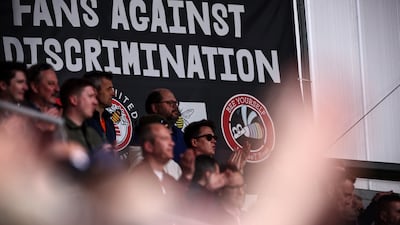Most black people in the UK say they have seen discrimination in work and some official settings, according to the largest survey of its kind.
Black people in Britain say they face discrimination from officialdom, including health care and the criminal justice system.
But they also have confidence in their and their family's future in Britain, the research commissioned by national civil rights group Black Equity Organisation found.
And 70 per cent of black respondents said footballers taking the knee raised awareness of racism.
“BEO's report highlights the continuing scale and scarring impact of discrimination against black British people across all walks of life,” said trustee chairwoman Dame Vivian Hunt.
“It damages community relations and erodes trust in the very institutions that should be working to improve outcomes.
“Racism harms all of British society. We have to work together to systematically address and change this pattern.
“It's just as important to note black people in the UK are resilient and optimistic about our shared future if we can systematically reduce racism and help everyone reach their full potential.”
Researchers found that 65 per cent of black respondents said they had been discriminated against by healthcare professionals, and 61 per cent said they had been passed over for promotion or employment because of their ethnicity.
Also, 59 per cent of the black respondents said they or someone close to them had been stopped and searched or were victims of wrongful arrest, with 42 per cent saying this happened more than once.
Half of parents of children under 18 said their children did not see themselves represented in teaching staff or the curriculum.
About 60 per cent of black respondents said they did not see the change needed to address these experiences coming from the institutions where they had been discriminated against.
Despite this, 55 per cent of respondents were confident of their and their family's future in Britain and 69 per cent were confident they could fulfil their potential in the UK.
BEO analysed polling by Survation of 2,051 black and mixed black adults between October 2021 and January 2022, and a survey of 2,049 respondents, including 1,721 white British adults, in October 2021.
It is believed to be the biggest opinion poll of its kind concerning black people's experiences in Britain.
The National Police Chiefs Council has launched a programme aimed at tackling discrimination.
“One of the key actions in the plan is to 'understand any disparity, seek to explain it or build a case for potential reform', and develop a new national approach to help forces tackle race disparities in their use of powers, including stop and search," said the programme director, Dep Chief Constable Tyron Joyce.
“We anticipate this is likely to include some changes in training.
"This will be supported by strengthened governance and oversight of the use of police powers at a national and local force level, including effective supervision and community scrutiny of police data and body-worn video footage of police interaction with black people.”
The government said it would consider the survey findings.
“The government is committed to achieving fairness and equality of opportunity for all, whatever their ethnicity or socio-economic background," an Equality Hub spokesman said.


